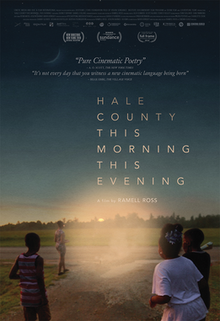Difference between revisions of "Hale County This Morning, This Evening"
| Line 1: | Line 1: | ||
| + | [[File:Hale County.png|thumb|200px|Hale County This Morning, This Evening]] | ||
Hale County This Morning, This Evening is a documentary movie directed by RaMell Ross that portrays the lives of African-American people lives in Hale County, Alabama. Hale County This Morning, This Evening, has garnered critical acclaim and a host of accolades, including an Academy Award nomination for Best Documentary Feature. An impressionistic and avant-garde film set in Hale County, Alabama, it examines the quotidian and intimate moments of its African American protagonists and the community in which they live. In his use of poetic images and nonclassical structure, Ross resists easy quantification and quick summary about black life in the South. <ref>Sheppard, Samantha N. | Hale County This Morning, This Evening is a documentary movie directed by RaMell Ross that portrays the lives of African-American people lives in Hale County, Alabama. Hale County This Morning, This Evening, has garnered critical acclaim and a host of accolades, including an Academy Award nomination for Best Documentary Feature. An impressionistic and avant-garde film set in Hale County, Alabama, it examines the quotidian and intimate moments of its African American protagonists and the community in which they live. In his use of poetic images and nonclassical structure, Ross resists easy quantification and quick summary about black life in the South. <ref>Sheppard, Samantha N. | ||
[https://www.theatlantic.com/entertainment/archive/2019/02/hale-county-best-documentary-nod-defies-oscar-norms/582976/ The Documentary That Bucks Oscar Trends—And Still Got a Nomination]. The Atlantic. 20 Feb 2019. Retrieved January 16 2021.</ref> | [https://www.theatlantic.com/entertainment/archive/2019/02/hale-county-best-documentary-nod-defies-oscar-norms/582976/ The Documentary That Bucks Oscar Trends—And Still Got a Nomination]. The Atlantic. 20 Feb 2019. Retrieved January 16 2021.</ref> | ||
Revision as of 14:01, 2 February 2021
Hale County This Morning, This Evening is a documentary movie directed by RaMell Ross that portrays the lives of African-American people lives in Hale County, Alabama. Hale County This Morning, This Evening, has garnered critical acclaim and a host of accolades, including an Academy Award nomination for Best Documentary Feature. An impressionistic and avant-garde film set in Hale County, Alabama, it examines the quotidian and intimate moments of its African American protagonists and the community in which they live. In his use of poetic images and nonclassical structure, Ross resists easy quantification and quick summary about black life in the South. [1]
Plot
Hale County This Morning, This Evening looks at the lives of Daniel Collins and Quincy Bryant, two young African American men from rural Hale County, Alabama, over the course of five years. Collins attends college in search of opportunity while Bryant becomes a father to an energetic son in an open-ended, poetic form that privileges the patiently observed interstices of their lives. The audience is invited to experience the mundane and monumental, birth and death, the quotidian and the sublime. These moments combine to communicate the region’s deep culture and provide glimpses of the complex ways the African American community’s collective image is integrated into America’s visual imagination. [2]
Racial discrimination
Hale County This Morning, This Evening had a scene where the camera then cuts to a close-up of the rearview mirror, revealing the white police officer who pulled them over. The image is layered with the sounds of Daniel’s distorted voice from back on the court, witnessing the slam dunk, and calling out: “Oh my God, whose child is this?!” As the audience ponders “what it thinks” about black men being treated differently than white people by the cops, Daniel’s exclaimed query enters the scene as both celebration and condemnation of the ways in which black people are spotlighted in American society. The Documentary That Bucks Oscar Trends—And Still Got a Nomination. The Atlantic. 20 Feb 2019. Retrieved January 16 2021.</ref> The producer could show the racial discrimination without making politics explicit, the ambient menace of cavalierly imposed power is made clear in scenes of police stops of young black male drivers. No overt cruelty is shown, and no abuses are depicted, but the tension and the fear aroused by these enforced encounters is palpable—and it’s reëmphasized in a sequence of poignant comedy, in which one young man playfully fantasizes about a movie that would be called “A World Without Guns.” As he elaborates the fantasy, it’s all too plain that it would be very similar to today’s world with guns: in his vision, police officers would instead be armed with spears and would throw them with deadly effect at people who flee. [3]
References
- ↑ Sheppard, Samantha N. The Documentary That Bucks Oscar Trends—And Still Got a Nomination. The Atlantic. 20 Feb 2019. Retrieved January 16 2021.
- ↑ Hale County This Morning, This Evening. Cinema Guild. Retrieved January 16 2021.
- ↑ Brody, Richard. The Experimental High Notes of “Hale County This Morning, This Evening”. The New Yorker. 19 September 2018. Retrieved January 16 2021.
